|
|
|
Sort Order |
|
|
|
Items / Page
|
|
|
|
|
|
|
| Srl | Item |
| 1 |
ID:
131776


|
|
|
|
|
| Publication |
2014.
|
| Summary/Abstract |
This paper examines how China and Japan fought for supremacy in China's treaty-port English-language press during the Jinan Incident of 1928. It argues that China's defeat in this media battle was a result of the long-term, unsettled political conditions the country was experiencing. The constant changes of government thwarted China's official and non-official efforts to establish a national news network. The threat from the northern warlords and China's intricate relations with the imperialist powers deterred the Nanjing regime from formulating decisive foreign propaganda policies. In contrast, Japan, with a strong news network in China, quickly installed its version of the event in the media. Its response was fast, consistent, and intensive. Japan also took advantage of the Nanjing Incident to justify its actions in Jinan. Press opinion in the treaty ports towards the Jinan Incident was split, with the British press supporting the Japanese and American papers favouring China's case. However, Japanese accounts, with the endorsement of the British treaty-port papers, still dominated the reports in The Times of London and influenced the views of the Manchester Guardian and The New York Times.
|
|
|
|
|
|
|
|
|
|
|
|
|
|
|
|
| 2 |
ID:
131779
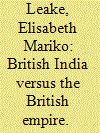

|
|
|
|
|
| Publication |
2014.
|
| Summary/Abstract |
From the end of the Great War to the onset of the Second World War, Great Britain and British India clashed over the Indian Army's role in imperial defence. Britain increasingly sought an imperial fighting force that it could deploy across the globe, but the government of India, limited by the growing independence movements, financial constraints, and-particularly-renewed tribal unrest on its North-West Frontier, refused to meet these demands. Attempts to reconcile Britain's and India's conflicting strategies made little headway until the late 1930s when compromise ultimately emerged with the establishment of the Expert Committee on the Defence of India 1938-39. While the Committee refuted India's traditional focus on the subcontinent's own security, importantly it recognized the necessity of British financial support for the Indian Army and the maintenance of a large local fighting force to prevent North-West Frontier unrest from disrupting imperial military planning at a time of global war.
|
|
|
|
|
|
|
|
|
|
|
|
|
|
|
|
| 3 |
ID:
131777
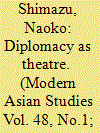

|
|
|
|
|
| Publication |
2014.
|
| Summary/Abstract |
As a significant 'moment' in twentieth-century international diplomacy, the rise of post-colonial Afro-Asia at the Bandung Conference of 1955 is replete with symbolic meanings. This paper proposes a conceptual approach to understanding the symbolic dimension of international diplomacy, and does so by ruminating on the newly unearthed Indonesian material on the Bandung Conference. To this end, 'diplomacy as theatre' is introduced as an interpretive framework to re-cast the conference as a theatrical performance, in which actors performed on the stage to audiences. Focusing on the city of Bandung, this paper reconstructs some examples of the 'performative' dimensions of international diplomacy, and elaborates on the notion of 'staging' the city and the role played by the people of Bandung, including the significance of conference venues, as well as the impromptu creation of a ritual citation that contributed to an iconic 'performative act' during the conference. Sukarno, Nehru, Zhou Enlai and Nasser all understood the importance as performers in their role as new international statesmen, representing the esprit de corps of the newly emergent post-colonial world. In deconstructing the symbolic, it will become evident that the role played by Indonesia significantly influenced the underlying script of the diplomatic theatre which unfolded at Bandung.
|
|
|
|
|
|
|
|
|
|
|
|
|
|
|
|
| 4 |
ID:
131774


|
|
|
|
|
| Publication |
2014.
|
| Summary/Abstract |
Drawing on twelve months of fieldwork in suburban Hyderabad, this paper explores the double binds experienced by middle-class young women as they attempt to meet the competing demands of 'respectable' and 'fashionable' femininity. For middle-class women, respectability requires purposeful movement, demure posture and modest clothing when in public, as well as avoidance of lower-class spaces where men congregate. Status can, however, also be achieved through more revealing fashionable clothing and consumption in elite public spaces. Whilst respectability for some sections of the middle class necessitates avoidance of even platonic relationships with the opposite sex, upper middle-class informants encourage heterosociality and for some upper middle-class and elite youth pre-marital romance is a form of 'fashion' due to its location in high-status spaces of leisure and consumption. The tensions described in this paper reveal the fragmentation of Hyderabad's middle class and the barriers to social mobility experienced by women for whom the relationship between legitimate cultural capital and feminine modesty is becoming increasingly complex.
|
|
|
|
|
|
|
|
|
|
|
|
|
|
|
|
| 5 |
ID:
131771
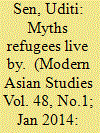

|
|
|
|
|
| Publication |
2014.
|
| Summary/Abstract |
Within the popular memory of the partition of India, the division of Bengal continues to evoke themes of political rupture, social tragedy, and nostalgia. The refugees or, more broadly speaking, Hindu migrants from East Bengal, are often the central agents of such narratives. This paper explores how the scholarship on East Bengali refugees portrays them either as hapless and passive victims of the regime of rehabilitation, which was designed to integrate refugees into the socio-economic fabric of India, or eulogizes them as heroic protagonists who successfully battled overwhelming adversity to wrest resettlement from a reluctant state. This split image of the Bengali refugee as both victim and victor obscures the complex nature of refugee agency. Through a case-study of the foundation and development of Bijoygarh colony, an illegal settlement of refugee-squatters on the outskirts of Calcutta, this paper will argue that refugee agency in post-partition West Bengal was inevitably moulded by social status and cultural capital. However, the collective memory of the establishment of squatters' colonies systematically ignores the role of caste and class affiliations in fracturing the refugee experience. Instead, it retells the refugees' quest for rehabilitation along the mythic trope of heroic and masculine struggle. This paper interrogates refugee reminiscences to illuminate their erasures and silences, delineating the mythic structure common to both popular and academic refugee histories and exploring its significance in constructing a specific cultural identity for Bengali refugees.
|
|
|
|
|
|
|
|
|
|
|
|
|
|
|
|
| 6 |
ID:
131770
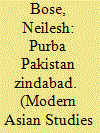

|
|
|
|
|
| Publication |
2014.
|
| Summary/Abstract |
This paper details the history of the concept of Pakistan as debated by Bengali intellectuals and literary critics from 1940-1947. Historians of late colonial South Asia and analysts of Pakistan have focused on the Punjab along with colonial Indian 'Muslim minority' provinces and their spokesmen like Muhammed Ali Jinnah, to the exclusion of the cultural and intellectual aspects of Bengali conceptions of the Pakistan idea. When Bengal has come into focus, the spotlight has centred on politicians like Fazlul Huq or Hassan Shahid Suhrawardy. This paper aims to provide a corrective to this lacuna by analyzing Bengali Muslim conceptualizations of the idea of Pakistan. Bengali Muslim thinkers, such as Abul Mansur Ahmed, Abul Kalam Shamsuddin, and Farrukh Ahmed, blended concepts of Pakistan inside locally grounded histories of the Bengali language and literature and worked within disciplines of geography and political economy. Many Bengali Muslim writers from 1940 to 1947 creatively integrated concepts of Pakistan in poetry, updating an older Bengali literary tradition begun in earlier generations. Through a discussion of the social history of its emergence along with the role of geography, political thought, and poetry, this paper discusses the significance of 'Pak-Bangla' cultural nationalism within late colonial South Asian history.
|
|
|
|
|
|
|
|
|
|
|
|
|
|
|
|
| 7 |
ID:
131772
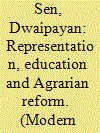

|
|
|
|
|
| Publication |
2014.
|
| Summary/Abstract |
This paper focusses on the Namasudra leader Jogendranath Mandal (1904-1968), and presents a study of the principal demands submitted by Scheduled Caste legislators over the course of the first half-decade of the Bengal legislative assembly. It seeks to understand these demands and why they were frustrated. It also traces and attempts to explain the withering away of Mandal's initial association with and favourable disposition towards the Congress. In contrast to accepted historiography, it argues that Scheduled Caste politics encompassed demands for representation, education and agrarian reform. It documents how their implementation (particularly the demand for representation) was compromised largely as a consequence of caste Hindu misrecognition.
|
|
|
|
|
|
|
|
|
|
|
|
|
|
|
|
| 8 |
ID:
131775
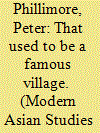

|
|
|
|
|
| Publication |
2014.
|
| Summary/Abstract |
This paper examines the changing reputation of one village in Himachal Pradesh, India, looking back over 30 years. This village has long had a singular identity and local notoriety for its association with jadu ('witchcraft'). I argue that in this village today the idea of 'witchcraft' as a potent malignant force is losing its old persuasiveness, and with this change the village is also shedding its unwanted reputation. Against claims for 'the modernity of witchcraft' in various parts of the world, I argue that, in this case at least, witchcraft is construed as distinctly unmodern. The capacity of jadu to cause fear and, equally, its value as an explanatory idiom are, I suggest, being overwhelmed by social changes, the cumulative effect of which has been to reduce the previous insularity of this village and greatly widen the social networks of its members. I pose two main questions. Why should this village have held such a particular reputation? And why should it now be on the wane? Linked to the second question is the relationship between this decline and local understandings of 'modernity'. In developing my argument around the specificity of an unusual village, I also consider the significance of 'the village' as both social entity and, formerly, one cornerstone of the anthropological project. Finally, I reflect on the methodological opportunities of long-term familiarity with a setting, exemplified in the iterative nature of learning ethnographically, as the children known initially in early fieldwork become the adult conversationalists of today, partners in interpreting their own village's past. In exploring their explanations for the decline in the salience of jadu, the pivotal impact of education and the pressures of 'time' created by the 'speed' of modernity are both salient.
|
|
|
|
|
|
|
|
|
|
|
|
|
|
|
|
| 9 |
ID:
131778


|
|
|
|
|
| Publication |
2014.
|
| Summary/Abstract |
This paper examines two linked cases of abortive Imperial expansion. The British invasion of Afghanistan and the Russian winter expedition to Khiva both took place in 1839, and both ended in disaster. These events were linked, not merely by coincidence, but by mutual reactions to intelligence received in Orenburg, St Petersburg, Calcutta, London, and Tehran. British and Russian officials shared similar fears about each other's ambitions in Central Asia, similar patterns of prejudice, arrogance and ignorance, and a similar sense of entitlement as the self-conscious agents of two 'Great Powers'. By examining the decision-making process which preceded these twin cases of expansion, and the British and Russian attitudes to Central Asian rulers and informants, the paper provides not only a deeper understanding of what provoked these particular disasters, but also of the wider process of European imperial expansion in the early nineteenth century.
|
|
|
|
|
|
|
|
|
|
|
|
|
|
|
|
|
|
|
|
|